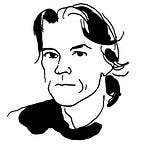Nineteen Eighty-Four: Reflections from a Late Reader
I recently read George Orwell’s groundbreaking book Nineteen Eighty-Four.
Late, I know. I should have read it when I was 20 or thereabouts, like everybody else. But I didn’t, and then the years went by, I read all kinds of other books, and as for Nineteen Eighty-Four, it was of course referenced to in all sorts of contexts, which made it feel as if I had actually read it. An article in The Guardian puts this well:
”… it has infiltrated the consciousness of countless people who have never read it. The phrases and concepts that Orwell minted have become essential fixtures of political language, still potent after decades of use and misuse: newspeak, Big Brother, the thought police, Room 101, the two minutes’ hate, doublethink, unperson, memory hole, telescreen, 2+2=5 and the ministry of truth.”
(In my defense, I did read three other Orwell books early on, Homage to Catalonia, Down and out in Paris and London and Animal Farm.)
Anyway, reading Nineteen Eighty-Four today was a fascinating experience. I liked it a lot as a novel, even if it probably doesn’t make it to the top ten on my list. But it is of course the theme, the political and societal setting and the analogies that are of the most interest.
Where have we seen hints of a thought-police and double-think? Pick your crisis, pick your perspective
It is not all too far-fetched to draw a few parallels with today’s world. On the other hand, it has been possible to draw parallels between Nineteen Eighty-Four and every period since 1948, when Orwell wrote it. Not the same parallels all along, but still.
Where have we seen hints of a thought-police and double-think? Pick your crisis, pick your perspective: In governance based on pandemic alarmism. In governance based on climate alarmism. In the use of terms like fake news and alternative facts during the Trump years. In the war on terrorism. And so on.
Many better thinkers than I have written whole theses about Orwell’s novel and its implications. I will just humbly add a couple of reflections.
One thing that is partly eerily like our world is the novel’s description of surveillance technology used for total control. One important difference, of course, is that totalitarian surveillance is still mostly theoretical and/or voluntary (with the possible exception of China). But that could change if things move in that direction and enough people acquiesce.
Another dominant theme in the book is constant war. Big Brother and his counterparts need a permanent external enemy in order to perpetuate fear and thus more easily control the populace. So the three gigantic empires of the Nineteen Eighty-Four world take turns declaring war against each other. A large part of the top-down indoctrination is about hating the enemy, whoever it is.
At first, I opined that this was one of the more contrived ideas of the book. If it was a prediction (which is by no means certain), Orwell got this one almost entirely wrong, I thought. Wars are less common today than they used to be. And they are generally less deadly, which is hard to believe if you get your entire worldview from the media and never check statistics.
That is why Russia’s archaic assault on Ukraine shocked us. It should. We shouldn’t be doing these things anymore. But when you take a closer look, armed conflicts increasingly tend to concentrate in a corridor from central Africa to the Middle East and easternmost Europe. From World War II to the 1980s, incredibly bloody wars plagued south and south-east Asia and large swaths of Africa, and horrific civil wars exacted tens of thousands of lives in Latin America. Not any more.
The current positioning ”war” between USA, Russia and China is beginning to look a little bit like Oceania, Eurasia and Eastasia
But there are of course other ”wars”, or war with other means, which perfectly serve the leaders’ need to show people that top-down leadership is called for. There is no lower boundary for what can be defined as a crisis. As we have noticed, they can be about energy, terrorism, financial collapses, migration, drugs or viruses, and when there is no acute reason at hand to scare people, climate always comes in handy.
In my view, the climate crisis narrative is an almost perfect policy tool for people in charge, because the processes it addresses have such extremely long lead times, and almost nobody knows enough about the science and trends to see through the storylines they are being fed.
As for the three Orwellian superpowers Oceania, Eastasia and Eurasia, I was unimpressed at first — again, to the extent they can be seen as a prediction. The geopolitical scheme seemed a bit like Samuel Huntington’s 1990’s thesis about an imminent clash of civilizations. And that didn’t come to pass.
But then I thought again. I reluctantly have to say that the current positioning ”war” between USA, Russia and China, with back-up from regions politically adjacent to respective power, is beginning to look a little bit like Oceania, Eurasia and Eastasia. The geographical delineations don’t exactly match the ones in Orwell’s novel. But closely enough…
***
If you like this piece, please check out my other essays on Medium
I have a podcast and a Youtube channel called Mind the Shift
I also have a website
